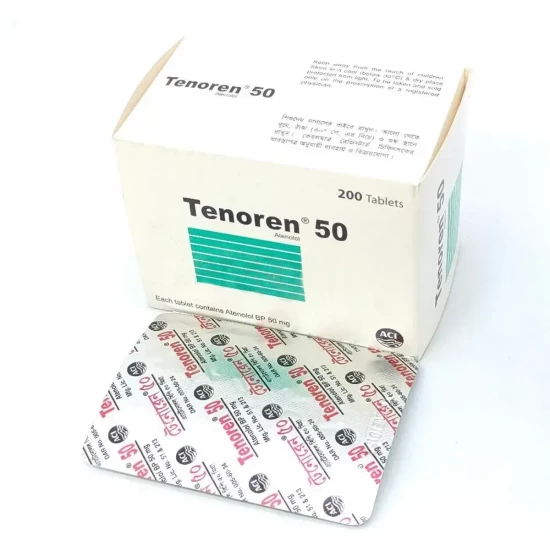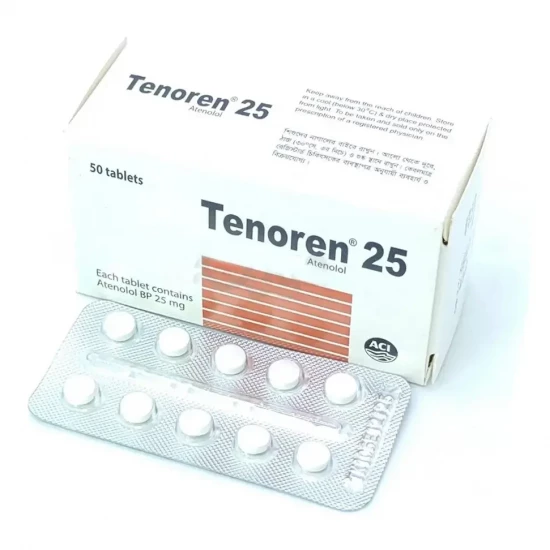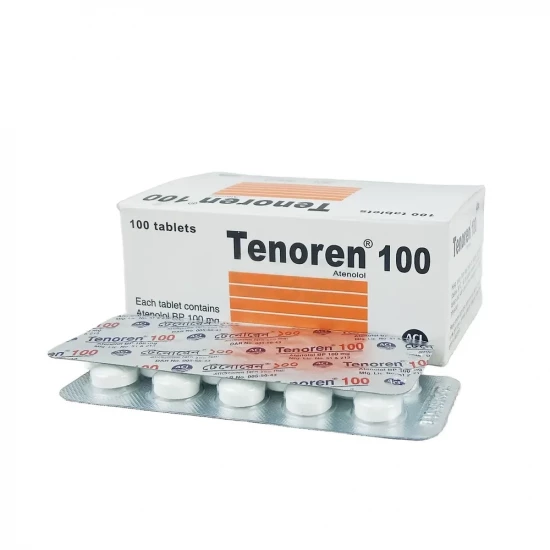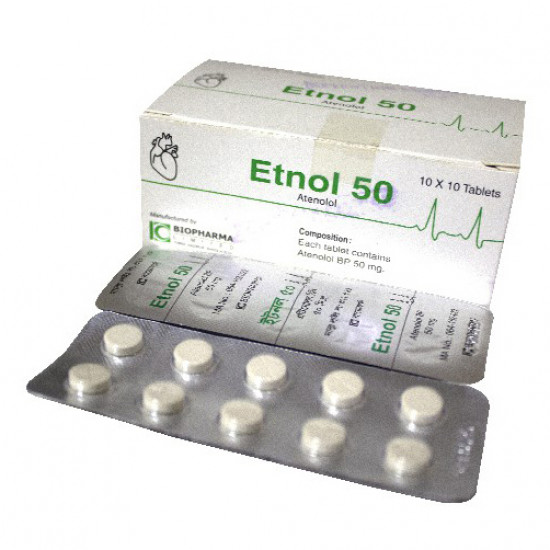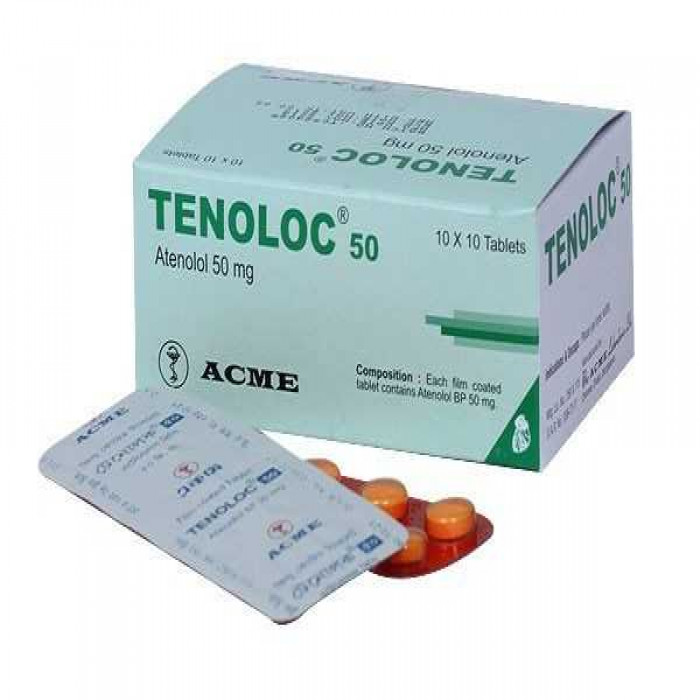
✔ 100% Authentic Product
👁️ Currently Viewing 1810
Manufacturer/Distributor: Beximco Pharmaceuticals Ltd.
Generic Name: Atenolol 50 mg Tablet
Discount
Price: ৳ 19
MRP:
৳
20
5%
Off

100% Genuine Products, Guaranteed

Safe & Secure Payments, Always

Fast, Secure & Efficient Delivery

Proper Packaging
 Cash on Delivery - All over Bangladesh
Cash on Delivery - All over Bangladesh Regular Delivery - 12-24 Hours, Dhaka City* Charge Tk.39-59
Regular Delivery - 12-24 Hours, Dhaka City* Charge Tk.39-59 Regular Delivery - 24-48 Hours, Other Cities* Charge Tk.99-110
Regular Delivery - 24-48 Hours, Other Cities* Charge Tk.99-110
 ফ্রি ডেলিভারিঃ - ৯৯৯ টাকা+ অর্ডারে, ঢাকা
শহরে
ফ্রি ডেলিভারিঃ - ৯৯৯ টাকা+ অর্ডারে, ঢাকা
শহরে ফ্রি ডেলিভারিঃ - ২৯৯৯ টাকা+ অর্ডারে, ঢাকার
বাহিরে
ফ্রি ডেলিভারিঃ - ২৯৯৯ টাকা+ অর্ডারে, ঢাকার
বাহিরে
100% Genuine Products, Guaranteed
Safe & Secure Payments, Always
Fast, Secure & Efficient Delivery
Proper Packaging
 Cash on Delivery - All over Bangladesh
Cash on Delivery - All over Bangladesh Regular Delivery - 12-24 Hours, Dhaka City* Charge Tk.39-59
Regular Delivery - 12-24 Hours, Dhaka City* Charge Tk.39-59 Regular Delivery - 24-48 Hours, Other Cities* Charge Tk.99-110
Regular Delivery - 24-48 Hours, Other Cities* Charge Tk.99-110 ফ্রি ডেলিভারিঃ - ৯৯৯ টাকা+ অর্ডারে, ঢাকা
শহরে
ফ্রি ডেলিভারিঃ - ৯৯৯ টাকা+ অর্ডারে, ঢাকা
শহরে ফ্রি ডেলিভারিঃ - ২৯৯৯ টাকা+ অর্ডারে, ঢাকার
বাহিরে
ফ্রি ডেলিভারিঃ - ২৯৯৯ টাকা+ অর্ডারে, ঢাকার
বাহিরে
✅ Description:
Indications of Lonet 50
Lonet 50 is indicated-
- In the management of hypertension. It may be used alone or concomitantly with other antihypertensive agents, particularly with a thiazide-type diuretic.
- For the long-term management of patients with angina pectoris.
- In the management of hemodynamically stable patients with definite or suspected acute myocardial infarction to reduce cardiovascular mortality.
Pharmacology of Lonet 50
Atenolol was created as a result of attempts to create a -adrenoceptor antagonist that would block 1 (cardiac) receptors while having no impact on 2-receptors. It's a 1 selective (cardioselective) -adrenergic receptor antagonist that doesn't have any membrane stability or partial agonist action. It is the most hydrophilic of the currently available - blockers, and as a result, it penetrates cell membrane lipids poorly.
Dosage & Administration
Hypertension: The initial dose of Atenolol is 50 mg given as one tablet a day either alone or added to diuretic therapy. The full effect of this dose will usually be seen within one to two weeks. If an optimal response is not achieved, the dosage should be increased to Atenolol 100 mg given as one tablet a day. Increasing the dosage beyond 100 mg a day is unlikely to produce any further benefit.
Angina Pectoris: The initial dose of Atenolol is 50 mg given as one tablet a day. If an optimal response is not achieved within one week, the dosage should be increased to Atenolol 100 mg given as one tablet a day. Some patients may require a dosage of 200 mg once a day for optimal effect. Twenty-four-hour control with once-daily dosing is achieved by giving doses larger than necessary to achieve an immediate maximum effect. The maximum early effect on exercise tolerance occurs with doses of 50 to 100 mg, but at these doses, the effect at 24 hours is attenuated, averaging about 50% to 75% of that observed with once-a-day oral doses of 200 mg.
Interaction of Lonet 50
When taken with beta-blocking medicines, catecholamine-depleting pharmaceuticals (e.g., reserpine) may have an additive impact. Patients taking Atenolol in combination with a catecholamine depletion should be constantly monitored for signs of hypotension and/or significant bradycardia, which can cause vertigo, syncope, or postural hypotension.
When used with Atenolol, calcium channel blockers may have an additional impact.
Disopyramide is a Type I antiarrhythmic with strong inotropic and chronotropic unfavorable effects. When used with beta-blockers, disopyramide has been linked to severe bradycardia, asystole, and cardiac failure.
Amiodarone is an antiarrhythmic medication having a negative chronotropic potential.
Contraindications
Sinus bradycardia, first-degree heart block, cardiogenic shock, and overt cardiac failure are all contraindications to taking atenolol.
Patients who have previously had hypersensitivity to Lonet 50 or any of the drug's components.
Side Effects of Lonet 50
- Bradycardia and hypotension were more common in a series of studies in the treatment of acute myocardial infarction, as expected with any beta-blocker. In addition, a number of side effects have been recorded with other beta-adrenergic blockers, which could be considered potential Atenolol side effects.
- Agranulocytosis is a hematologic condition.
- Fever, aching and sore throat, laryngospasm, and respiratory distress are all symptoms of an allergic reaction.
- The Central Nervous System (CNS) is the body's central nervous system Reversible mental depression that progresses to catatonia; an acute reversible condition marked by the disorientation of time and location, short-term memory loss, emotional lability, and a slightly clouded sensorium; and, a decrease in mental capacity.
Pregnancy & Lactation
Pregnancy Category D. Caution should be exercised when Atenolol is administered to a nursing woman. Clinically significant bradycardia has been reported in breast-fed infants. Premature infants, or infants with impaired renal function, may be more likely to develop adverse effects.
Precautions & Warnings
Patients who are already on a beta-blocker should be carefully assessed before receiving Atenolol. Depending on clinical data such as pulse and blood pressure, the initial and subsequent Atenolol dosages can be adjusted downward. Atenolol can make circulation problems in the peripheral arteries worse.
Impaired Renal Function: Patients with impaired renal function should use the medication with caution.
Therapeutic Class
Beta-adrenoceptor blocking drugs, Beta-blockers
Storage Conditions
Store in a dry area at a temperature of not more than 30°C. Light and dampness should be avoided. Keep out of children's reach.
⚠️Disclaimer:
At ePharma, we’re committed to providing accurate and accessible health information. However, all content is intended for informational purposes only and should not replace medical advice from a qualified physician. Please consult your healthcare provider for personalized guidance. We aim to support, not substitute, the doctor-patient relationship.




